U.S. Rep. Glenn Grothman Wisconsin’s 6th Congressional District | Official U.S. House headshot
U.S. Rep. Glenn Grothman Wisconsin’s 6th Congressional District | Official U.S. House headshot
Congressman Glenn Grothman has reintroduced the No Industrial Restrictions in Secret Act (No IRIS Act) to address concerns about the Environmental Protection Agency's (EPA) Integrated Risk Information System (IRIS). The bill aims to protect American safety and jobs by ensuring that chemical risk assessments conducted by the EPA are based on sound science rather than political influences.
The legislation is supported by entities such as the American Chemistry Council, Hexion Specialty Chemicals, and over 80 manufacturers nationwide. It is cosponsored by Representatives Jake Ellzey, Julie Letlow, and Michael Guest. Additionally, it serves as companion legislation to a similar bill introduced by Senator John Kennedy in the U.S. Senate.
"Unelected bureaucrats have often disrupted the work of Wisconsin's chemical manufacturers and inhibited the success of the industry through the abuse of the EPA’s IRIS program," said Grothman. He emphasized that "the No IRIS Act will protect American jobs, promote innovation, and hold the EPA accountable for acting against the best interest of the industry and our economy."
Senator Kennedy also criticized past uses of IRIS: "For four years, the Biden administration weaponized the EPA’s IRIS program against America’s chemical industry. My bill would prevent this kind of abuse from happening again and safeguard American businesses from government overreach."
Chris Jahn, President and CEO of the American Chemistry Council, expressed support for congressional action: "American success relies on American chemistry... Unfortunately, the EPA’s IRIS program puts many critical chemistries in jeopardy." Jahn called for Congress and EPA to prioritize sound science in regulatory decision-making.
The EPA established IRIS in 1985 to assess how chemicals affect human health. However, it was never authorized by Congress. Critics argue that under previous administrations, flawed data from IRIS assessments influenced rulemaking processes at significant cost to private industries.
The No IRIS Act seeks to prevent reliance on IRIS assessments as a primary source for drafting regulations. In November 2023, Grothman's amendment restricting funding for IRIS was included in a House-passed appropriations bill.






 Alerts Sign-up
Alerts Sign-up